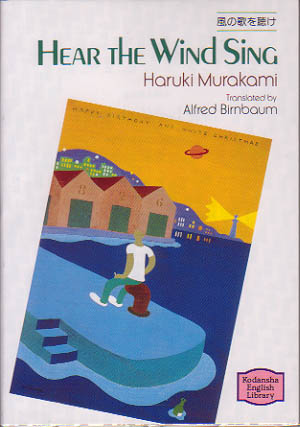September 29th, 2010
Haruki Murakami Begins

“You keep looking at the sea and you start to miss being with people; you stay around people all the time and you just want to look at the sea. Funny about that.”
For reasons that aren’t entirely clear to me, I decided to start reading Haruki Murakami again. As a warm-up, I read Jay Rubin’s Haruki Murakami and the Music of Words before plunging once again into Murakami’s first novel, Hear the Wind Sing. I did something like this before with my previous blog when I heard that a film adaptation of Norwegian Wood was in the works, and now that Tran Anh Hung’s version has been filmed, perhaps that’s part of the impetus to reacquaint myself with the work of one of my favorite authors. My last attempt at a Murakami marathon didn’t get quite as far as I planned (I had, quite ambitiously, thought I would read all of Murakami’s books in the order they were published in Japan and then write about them), but I think I might give it another go.
Published as Kaze no Uta o Kike in 1979, Hear the Wind Sing wasn’t translated until 1987 by Alfred Birnbaum. And funnily enough, the English translations for this novel and his second book, Pinball 1973 — have never been made available by any American publisher. They are only published in Japan as part of the Kodansha English Library. To my knowledge, Murakami has never provided an actual answer as to why these works have not been published in the West, but each novel’s length as well as its narrative content may factor into the decision. However, thanks to ebay and Amazon, these books are not completely out of reach.
According to the author, the idea for the book originated when Murakami was watching a baseball game. He became possessed with the idea that he must write a novel, and so, while running the bar Peter Cat for his father-in-law, Murakami would write for an hour every night for the next three months. After submitting the finished manuscript to a literary magazine, he won the Gunzo Literary Prize right off the bat. Not a bad start, eh?
“There’s no such thing as perfect writing. Just like there’s no such thing as perfect despair.” These are the first lines of Haruki Murakami’s debut novel, Hear the Wind Sing. Spanning August 8-26th of 1970, the novel details — among other things — how our unnamed narrator took home a drunk woman (who possesses four fingers on her left hand) and ends up spending the night at her place. When the woman wakes up the next morning, she has no idea how she got there and what exactly she did or didn’t do with our protagonist. The usual misunderstandings ensue, although the outcome is less Three’s Company than the premise suggests. Along the way, we learn the origin of the narrator’s friendship with The Rat (who will figure prominently in both Pinball 1973 and Wild Sheep Chase), and just what the heck was eating away at that mystery girl for her to get so wasted in the first place.
At only 130 pages, Hear the Wind Sing makes for an amazingly brisk read. If Murakami’s career were a banquet, then Hear the Wind Sing is a light, but tasty appetizer that leaves you wanting more. And more he would deliver.
As a side note, the book was turned into a movie in 1980, one that Murakami himself pretty much hated. If anyone has a link to a trailer, I’d love to see it. I haven’t been able to find an active link yet.
Soon: Pinball 1973

